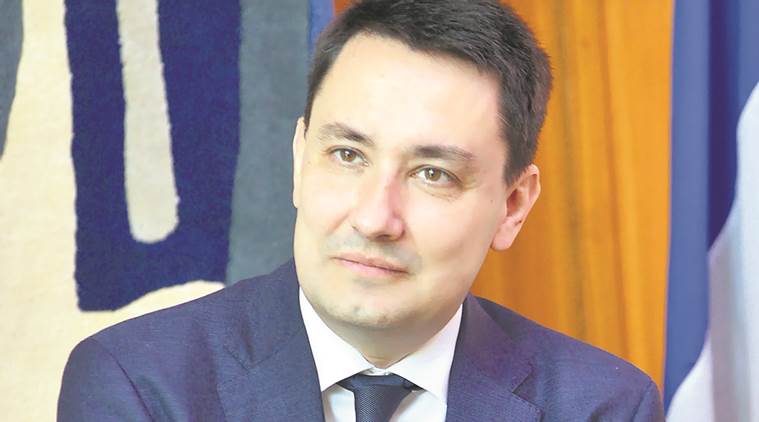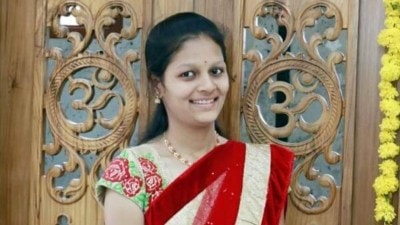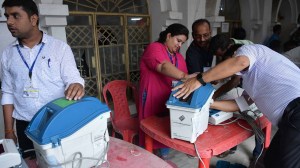- India
- International
‘Rafale was selected after an extremely rigorous, transparent procedure’: Alexandre Ziegler
On Thursday, first of the six Scorpene-class submarines built by Mazgaon Dock Limited was formally inducted into Indian Navy by PM Modi. French envoy Alexandre Ziegler, spoke to The Indian Express on Indo-French co-operation and other issues.
 Alexandre Ziegler, ambassador of France to India. Express
Alexandre Ziegler, ambassador of France to India. Express
Both France and India have a major challenge — of countering terrorism, having faced attacks in Paris and Mumbai. What has been the level of co-operation between the two countries after 2008 on this front?
Counter-terrorism is the cornerstone of our strategic partnership with India. Both countries have faced terrible attacks and demonstrated their capacity to fight back. We are in full solidarity against terrorism. We know that in difficult times we can count on each other. France has very firmly condemned the terrorist attacks against India and called on decisive action to be taken against terrorist groups targeting India, particularly the Lashkar-e-Taiba, the Jaish-e-Mohammad and the Hizb-ul-Mujahideen. Cross-border terrorism has to stop. The emergence of Daesh/ISIS in South Asia is an added reason for strengthening our counter-terrorism cooperation. Concretely, we work at the United Nations and within the EU to list terrorist organisations and individuals. On the operational front, we are expanding cooperation with India and building a set of exchanges and joint actions between our special security forces, armed forces and cyber experts.
Defence has been another area of co-operation. There is the agreement on the Rafale fighter jets. Concerns have been raised over the deal by the Congress party. What are your views?
Our defence cooperation with India dates back to over 50 years. It is based on mutual trust and an all-weather friendship. India has acquired a formidable defence apparatus with the Rafale: it is the world’s best omnirole combat aircraft. The Rafale was selected for its outstanding performance and competitive price, after an extremely rigorous and transparent procedure conducted in full compliance with applicable Indian rules and regulations. This deal, which has been concluded in a government-to-government framework, will also contribute to the development of the Indian defence industry and benefit both major companies and SMEs in India.
The other deal is on submarines. What’s the plan on this going ahead?

I was in Mumbai precisely to attend the commissioning of the INS Kalvari. The INS Kalvari is the first of six Scorpene-class stealth submarines built by the Mazagon Dock Shipbuilders in collaboration with the French Naval Group. It is an excellent illustration of our exemplary strategic and industrial partnership with India and our capacity to build very advanced defence equipment together in India. The Scorpenes will enable the Indian Navy to possess unrivalled submarine assets in the region for protecting India’s strategic maritime interests. Regarding plans ahead, we already have in-depth experience of successful cooperation with the Indian industry to build modern and effective submarines in India and are keen on developing it further.
France has signalled its intention to accept more immigrants and more student professionals. What are the areas or sectors where France looks to accept immigrants and also if rules for Indian students keen to study in France will be eased?
France is an open country. At a time when other countries are tending to close their borders, France continues to welcome foreign talent with open arms and offer them the best education and professional opportunities. We have set a target of 10,000 Indian students in France by 2020 and we do a lot to attract them. France spends 7 crore each year to support Indian students’ mobility to France. In addition, our visa policy for Indian students is very attractive. Visa procedures for Indian students wishing to study in France have been simplified. Indian students who graduate from French higher education institutions can extend their stay for up to two years if they wish to acquire work experience there. Furthermore, Indian alumni who hold a degree at the Master’s or higher level from a French higher education institution are granted tourist or business visas with a five-year validity period — the longest allowed in Schengen countries. Finally, the “Talent Passport”, a long-term residence permit (four years) instituted in 2016, is designed for highly skilled foreigners (researchers, scientists, artists) wishing to settle in France. Employability is another asset: 100 per cent of the students in French engineering schools get a job at the end of their studies.
India and France have for long had strong cultural bonds. Bonjour India is seen as reflecting that. What are the plans to broaden this engagement on both sides, be it cultural events, films, exhibitions etc.?
Exactly, it is the third edition of Bonjour India, but it comes with a brand new concept: more collaborative, more focused on the youth and innovation. It is much more than a festival. It’s an Indo-French moment, aimed at showcasing all aspects of our relationship, and especially our growing partnership for the future of our planet. With more than 300 events in 33 cities during over three months, we will focus on three main concepts: Smart Citizen, High Mobility and Go Green. We hope to do more on people-to-people ties, particularly for student and artist exchanges. That’s the main goal of Bonjour India and that’s the core focus of the years to come.
Apart from this, I’m very actively working towards making France a destination for more Indian film shoots. In this regard, the success of “Befikre” is very encouraging. We have to do more with Indian production houses, especially here in Mumbai.
Over the last few years, outbound tourism growth has been strong especially to Europe, including France. Given the prospect of more Indians travelling overseas on holiday, is France looking at easing travel and stay rules to attract more tourists?
Yes, it is a priority of the French government for several years now. With close to 83 million tourists in 2016 — including six lakh from India — France is the top global tourist destination. We have been doing a lot in this regard, especially for visas, which we have been issuing in 48 hours since 2014. More Visa Facilitation Service Centres (VFS) were opened, bringing their number to a total of 14 all over India. Last May, I inaugurated the first France tourism kiosk at the Bengaluru VFS Centre. I am delighted that VFS is joining hands with Atout France, the French Tourism Promotion Agency, on this global pilot project for the promotion of France’s matchless destinations geared towards Indian tourists, whom we look forward to welcoming in yet greater numbers. The advantage of these kiosks is that, apart from information on destinations, Indian travellers can purchase metro tickets or entry tickets to certain monuments even before they land in France. Two other such centres have opened recently in Mumbai and Delhi, and I hope that many more will open soon. We are also creating new tourism promotion spaces in the Alliance Française network all over India. I am confident that all these initiatives will be well received and contribute to boosting Indian tourism in France.
The Make in India programme is an area of interest for many investors. Is French industry looking at more partnerships on this and how is French engagement in Indian industry looking now?
The Make in India programme developed by Prime Minister Modi offers tremendous opportunities for French companies, which have understood and incorporated this principle in their projects. Areas such as the development of Smart Cities, sustainable transport, renewable energy, wherein French companies have great expertise to fulfil India’s requirements, are especially promising. In solar energy, for instance, French companies account for 10 per cent of the total installed capacity. Beyond that, be it in the automotive, pharmacological chemistry, mechanical engineering, or aerospace industries, there are many examples of great success. To mention just a couple, the Kwid launched by Renault — which is made in Chennai — is a huge success with Indian consumers; from 2018, the Alstom production unit in Bihar will produce a total of 800 locomotives ordered by the Indian Railways. I would like to add that French companies not only make in India, but they also innovate in India, with 25 R&D centres established across the country.
It’s been a while after the agreement for the Jaitapur nuclear plant was signed. There have been hitches. What’s the update on the project and the view from the French side on this?
Yes, it’s a milestone project for both India and France. There is a political and industrial will to take the project forward and the negotiations are on the right track. This project is significant for India’s economic development and fight against climate change. Six EPRs of nearly 10 GW is a significant contribution to India’s goal of producing 63 GW of nuclear power by 2030. A major contribution to the goal of producing 40 per cent of its electricity from non-fossil energy by 2030, in accordance with its commitments made before the 2015 Paris Climate Conference. Jaitapur will also contribute to the Make in India and Skill India programmes. It involves, among others, transfers of production mechanisms and technologies, joint research, and training.
Apr 19: Latest News
- 01
- 02
- 03
- 04
- 05






































